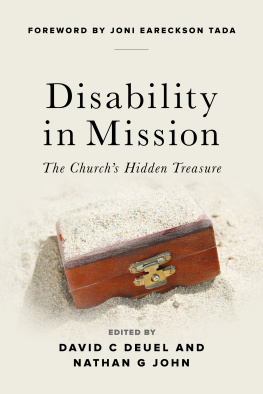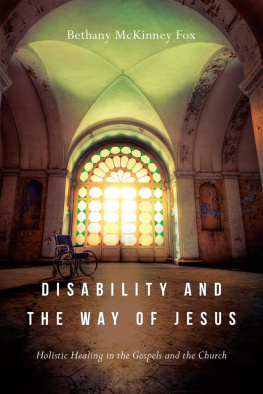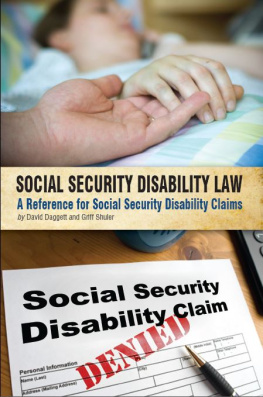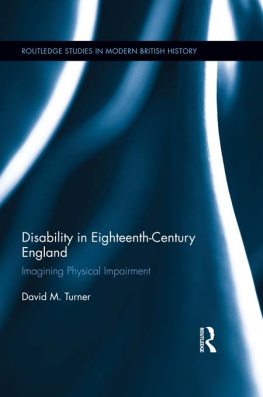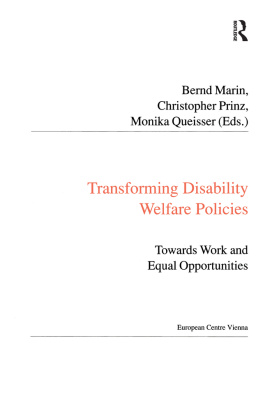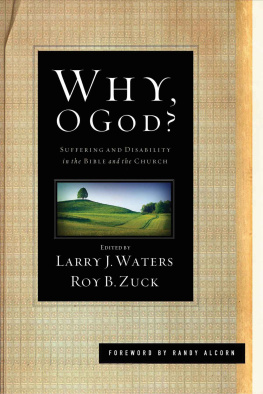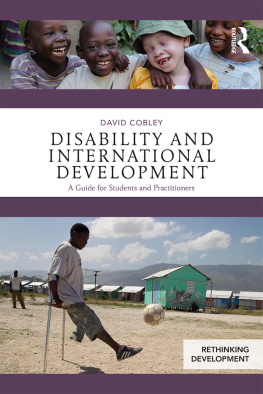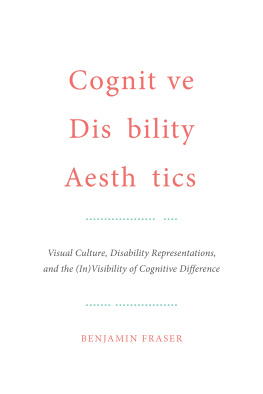Chapter 11: Mission Possible: The Role of Member Care in Mobilizing Workers with Disabilities
(Deanna Richey)
Disability in Mission: The Churchs Hidden Treasure (ebook edition)
Hendrickson Publishers Marketing, LLC
P. O. Box 3473
Peabody, Massachusetts 01961-3473
www.hendrickson.com
ebook ISBN 978-1-68307-288-1
2019 by The Lausanne Movement
This book was compiled in collaboration with Joni and Friends.
All rights reserved. No part of this book may be reproduced or transmitted in any form or by any means, electronic or mechanical, including photocopying, recording, or by any information storage and retrieval system, without permission in writing from the publisher.
All Scripture quotations, unless otherwise indicated, are taken from the Holy Bible, New International Version, NIV. Copyright 1973, 1978, 1984, 2011 by Biblica, Inc. Used by permission of Zondervan. All rights reserved worldwide. www.zondervan.com. The NIV and New International Version are trademarks registered in the United States Patent and Trademark Office by Biblica, Inc.
Scripture quotations marked (ESV) are taken from the Holy Bible, English Standard Version (ESV), copyright 2001, by Crossway, a publishing ministry of Good News Publishers. Used by permission. All rights reserved.
Scripture quotations marked (NLT) are taken from the Holy Bible, New Living Translation, copyright 1996. Used by permission of Tyndale House Publishers, Inc., Wheaton, Illinois 60189. All rights reserved.
Due to technical issues, this eBook may not contain all of the images or diagrams in the original print edition of the work. In addition, adapting the print edition to the eBook format may require some other layout and feature changes to be made.
Cover design by John Ruffin
First eBook edition August 2019
For Elena Down, who showed by her life how God
works powerfully in mission through disability.
(19722017)
Elena had agreed to contribute to this book, but she died unexpectedly from a pulmonary embolism on a flight to Geneva in March 2017. We dedicate this book to her memory.
Elena completed a law degree in 1997 and immediately wanted to apply her skills in missions. Despite being profoundly hearing-impaired, she did not want to be identified as disabled, and resisted invitations at first to minister amongst the deaf just because she herself was deaf. However, over time she came to see her deafness as a gift to minister to the deaf.
She worked as a volunteer at the Nambikkai Project for the Deaf in rural India. She learned the local sign language and taught the young women to swim (in their saris!). Elena wrote in her diary: I learned a lot in Indiaabout myself, my values and Gods values. I could see that my deafness was something that could open doors to enable other people to know God.
Returning to Australia, she worked as a lawyer with the Australian Government Solicitor in Melbourne and then Canberra.
For eight years Elena served at the Attorney-Generals Department, in copyright law, international law, human rights policy and disability discrimination. This included playing a key role as principal legal officer in Australias negotiations onand subsequent signature ofthe UN Conventions on the Rights of Persons with Disabilities. Elena was chosen as a torch-bearer in the Sydney Olympics torch relay, carrying it for two legs in Canberra.
From 2003 to 2004 she took two years leave without pay to work with the deaf in China. During this time, she mastered both written and spoken Mandarinan impossibility for the deafand acquired several different Chinese sign languages. She established a support program for parents of deaf children and mentored deaf university students. She saw needs which others hadnt seen, and tackled them with imagination. For example, she recruited a group of deaf adults to tutor parents of deaf children in sign language. She also acted as a catalyst in forming a church for the deaf.
This book is the poorer without Elenas chapter, but her legacy lives on to eternity in many lives.
Chapter Summaries
Chapters 1 and 2: These look at passages from Scripture that help us appreciate how weakness, vulnerability and disability embody the gospel, and have power to bring transformation. They describe how weakness is central to the redemptive plan of our all-powerful God, and how disability often, although not always, results in an experience of weakness. Drawing on Pauls story and then on Moses story, David Deuel describes how weakness is the means of success, not failure, for when Christians are weak, then they are strong. God, who resists the proud and gives grace to the humble, often confounds earthly powers through the weakness of his chosen vessels. It is through weakness that the mission of God is advanced.
Chapter 3: Bonnie Armistead describes how the birth of Anna, with Down syndrome, caused them to doubt Gods calling. Their story shows that Annas disability is actually an inseparable part of their calling. They witness Gods sovereign purposes in the way he shapes them, redirects their ministry and impacts the community in which they work.
Chapter 4: J M Paul describes a deep joy from sharing in the life and mission of their sons few years on earth. Through Adams profound disability and their own struggles, they experienced a King who was able to work through broken people to restore broken things. Adams disability profoundly shaped their family and their approach to mission. Adam taught them that this is Gods mission, and we play a humble, often broken, role in that mission. In a moving tribute, J M describes how Adams legacy will live on in their mission journey and in the journey of many others whom God challenged and changed through Adam. She concludes In the days God ordained, he has worked beyond our imagination in Adams life and, in painful but beautiful ways, he continues to work through his death. We know that this is not the end of the story.
Chapter 5: Barry Funnell relates how an accident and resultant paraplegia transformed his selfish independence and pride into complete dependence on God. Barrys life-threatening accident also gave him a sense of urgency as he realised all human beings are only one last breath away from eternity. Rather than being a stumbling block to missions, his disability has served as a springboard. God used him to make great strides in Bible translation through ten years in Malawi, five years in Tanzania and various consultancies throughout South East Asia.
Chapter 6: This outlines a beautiful story from the early twentieth century where God works powerfully in weakness through the ministry of Paul Kasonga, who is disabled with leprosy, and Olive Doke. For Paul and Olive, weakness was the very basis of their service to each other, to Christ and to the nation of Zambia. David Deuel outlines how Kasonga and Dokes work was formative in a movement that saw upwards of 80 percent of the Zambian national population turn to Christ, and continues even today through its spiritual descendants.

